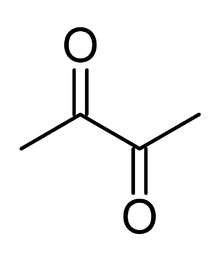Diketone

A diketone is a molecule containing two ketone groups. The simpliest diketone is diacetyl, also known as 2,3-butanedione. Diacetyl, acetylacetone, and hexane-2,5-dione are examples of 1,2-, 1,3-, and 1,4-diketones, respectively. Dimedone is an example of a cyclic diketone.
1,2-Diketones
An important member is biacetyl, CH3C(O)C(O)CH3. These compounds are often generated by dehydrogenation of the diols:[1]
- RCH(OH)CH(OH)R → RC(O)C(O)R + 2 H2
A distinctive feature of 1,2-diketones is the long C-C bond linking the carbonyls. This bond distance is about 1.54 Å, compared to 1.45 Å for the corresponding bond in 1,3-butadiene. The effect is attributed to repulsion between the somewhat polarized carbonyl carbon centers.[2]
1,2-Diketones condense with many bifunctional nucleophiles, such as urea and thiourea to give heterocycles. Upon condensation with aromatic amines, they convert to the diketimine ligands.
1,3-Diketones
An important member is acetylacetone, CH3C(O)CH2C(O)CH3. Acetylacetone is prepared industrially by the thermal rearrangement of isopropenylacetate.[1]
- CH2(CH3)COC(O)Me → MeC(O)CH2C(O)Me
Classically, 1,3-diketones are prepared by condensation of ketones with esters.
1,3-Diketones are prone to exist as enols because of conjugation of the enol or enolate with the other carbonyl group, and the stability gained in forming a six-membered ring, (hydrogen bonded in the case of the enol or containing the counter ion in the case of the enolate).
Like other diketones, 1,3-diketones are versatile precursors to heterocycles. Hydrazine, for example, condenses to give pyrazoles. The conjugate base derived from 1,3-ketones form coordination complexes. In the DeMayo reaction 1,3-diketones react with alkenes in a photochemical pericyclic reaction to form (substituted) 1,5-diketones.
1,4-Diketones
Diketones with two methylene groups separating the carbonyl groups typically coexist with their enol tautomers. 1,4-Diketones are useful precursors to heterocycles via the Paal-Knorr Synthesis, which gives furans, pyrroles, and thiophenes.
The condensation of 1,4-diketones (and related substrates) with hydrazines afford dihydropyridazines, which can be converted to pyridazines.
Other diketones
The reactions of diketones where the carbonyl centers are separated by three or more methylene groups are similar to those of simple ketones. These longer diketones are generally prone to intramolecular aldol condensations.
EU Regulation
In 2004, the EU conducted an examination of certain flavoring additives grouped together as "Flavouring Group Evaluation FGE.11". This group included diketones.[3] As part of that study, the EU found that acetylacetone (pentane-2,4-dione) (FL 07.191) was genotoxic in vivo and in vitro, and deleted it from the register of permitted flavoring substances.[4] The register of permitted flavoring substances was adopted in 1999.[5]
References
- ↑ 1.0 1.1 Hardo Siegel, Manfred Eggersdorfer “Ketones” in Ullmann’s Encyclopedia of Industrial Chemistry, Wiley-VCH, 2002, Wienheim. doi:10.1002/14356007.a15_077
- ↑ K. Eriks , T. D. Hayden , S. Hsi Yang , I. Y. Chan "Crystal and molecular structure of biacetyl (2,3-butanedione), (H3CCO)2, at -12 and -100 °C" J. Am. Chem. Soc., 1983, 105 (12), pp 3940–3942. doi:10.1021/ja00350a032
- ↑ Opinion of the Scientific Panel on Food Additives, Flavourings, Processing Aids and Materials in contact with Food, EFSA Journal (2004) 166, 1-44
- ↑ COMMISSION DECISION of 18 May 2005 amending Decision 1999/217/EC as regards the register of flavouring substances used in or on foodstuffs, Official Journal of the European Union
- ↑ Official Journal of the European Communities

